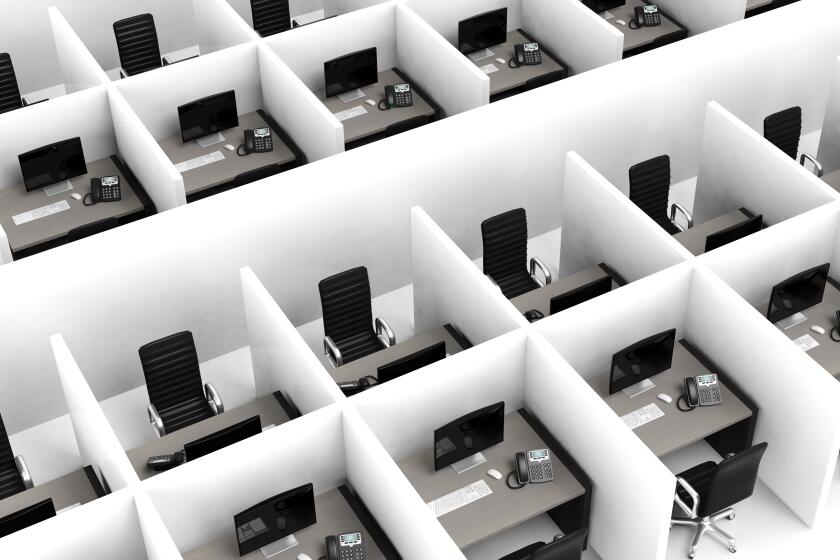Working from home is awesome. Here’s how to excel at it

- Share via
I love working from home.
I learned this week that this is apparently a controversial stance. The unfolding coronavirus crisis is forcing many of us to work from home in an effort to help stop the spread. Not everyone greeted the news with a cheer. And that’s how I learned there are some people who claim to enjoy putting on work clothes and packing a sad desk lunch and battling morning traffic. Not me.
I’ve had jobs where I worked from home full-time, and jobs — like the one I have now — where I normally work from home every once in a while. I don’t want to brag, but I’m pretty good at it.
A lot of the “how to work from home” guides popping up this week seem to assume no one has ever pulled out their laptop to check their work email from home before. I trust you know the basics. So here are some tips to work from home more efficiently, stay connected with your colleagues, and maybe even enjoy yourself a little bit.
1. Sleep later.
How long is your commute? And how long is your pre-office morning routine — selecting an outfit, doing your hair, figuring out what you’ll eat that day and deciding whether to pack a gym bag? Add that time up, and then set your morning alarm back by that amount of time.
Here’s what you actually need to do before you start working from home: Be physically conscious and in front of a computer. That’s it. I am firmly on team “only get dressed if you want to.” I get up, start the coffeemaker, wash my face, brush my hair, put on a different T-shirt than the one I slept in, make up a bowl of cereal and a cup of the aforementioned coffee, and take it to my desk. And so my workday begins.
There is no reason to “maintain your normal routine” and not take advantage of this opportunity for extra sleep. Plus, getting those critical extra Zzzs can help keep you from getting sick. Sleep in later — for your health.
2. Set up your desk.
Whatever space you’re going to be working from at home, clean it. Normally, my desk at home has a bunch of bills I need to file, a few bottles of nail polish, a couple of books, some mail and a handful of old newspapers. If you are like me, mend your wicked ways. Make your home desk (or kitchen table) feel like your work desk. Have everything there that you’d have at work: a phone charger, a box of tissues, a water bottle, a mug, pens and paper.
If you don’t have a desktop computer, try to set up your laptop in a way that your neck won’t ache by the end of the workday. Consider putting your laptop on a stack of books and use an external keyboard and mouse so that you’re staring straight at your screen, not down at it.
And don’t forget to get away from your desk. Take lunch away from your computer screen. At the end of your workday, get up and do something else for a while to differentiate your brain from “working time.” Remember to stretch.
3. Be ready for prime time.
Teleconferencing and video calls are not the future. They are the present. Save your office’s dial-in number to your phone’s favorites so you’re ready to jump on a call at a moment’s notice.
I briefly worked as a producer for an ill-fated digital venture called HuffPost Live. A big part of my job was to wrangle guests into joining a video Google Hangout and teach them how to be semi-presentable on camera. Here’s what you need to do:
- Figure out where you’re going to sit in your home when you’re on video calls and do a test run. Make sure whatever is in view is clean and presentable. I don’t care how you live but I don’t want to have to bear witness to your shame.
- If you’re using a laptop camera, put it on a stack of books so that you’re looking straight into the camera, not down at it. This is mostly to avoid the dreaded “Dear God, does my chin really look like that?” double take once you’re in the meeting. You want to be able to focus on your coworkers, not your face.
- Check the lighting. The light source should be coming from behind your computer screen. It should not be in frame with you on camera. If you have a desk lamp with a flexible arm, you can position that right behind your monitor with the light pointed directly at your face.
- Wear lipstick. Our brains use visual input to decipher what someone is saying. That’s why it’s so disconcerting when the lip sync on your TV is off. Differentiating your lips from the rest of your face will help the people on the other side of the screen tell what you’re saying. (If you don’t wear lipstick, even just a swipe of lip balm will help.)
- Framing-wise, you want the camera to see from your chest to a few inches above the top of your head. Filling the entire screen with a close-up of your face is bad. So is sitting too far away, which also makes it very difficult to hear you.
4. Make your home a more pleasant place to be.
Take the opportunity of your extended presence at home to make it nice for yourself. If you haven’t already, stock up on extra pantry staples for meals: oils and butter, salt and spices, things like canned tomatoes and garlic that pop up in every recipe. Stay on top of keeping the kitchen clean so you aren’t walking past a pile of dirty dishes every time you go to refill your coffee.
There’s never been a better time to wipe down your bathroom counters and wash your hand towels and bath mat. While you’re at it, change your sheets and wash your pajamas.
With nothing on your evening agenda, cook slow, luxurious meals. I recently made Marcella Hazan’s Bolognese and Alison Roman’s pork shoulder, both of which require hours and hours of cooking time (most of it hands-off for you). If you’re trying to avoid excess trips to the grocery store at this juncture, this Twitter thread has ideas for easy recipes you can make with things you probably already have on hand.
Just because you’re staying home doesn’t mean you have to be lonely. How to set up video chats for a dinner party, game night, karaoke session and more.
5. Maintain your connections and your mental health.
Staying away from the office means missing out on casual day-to-day conversation with your colleagues. Make it a point to spend more of your free time reaching out to people via text and on social media. And video calls aren’t just for coworkers: Set up a Skype or FaceTime call with friends or relatives. You can also host a virtual game night with things like Jackbox.
There’s a lot of coronavirus news out there. My coworker wrote this guide to not stressing out too much about it.Easier said than done, but worth trying.
Let me leave you with this, the single most important advice I can possibly impart to you:
Mute yourself on conference calls.
More to Read
Sign up for The Wild
We’ll help you find the best places to hike, bike and run, as well as the perfect silent spots for meditation and yoga.
You may occasionally receive promotional content from the Los Angeles Times.











